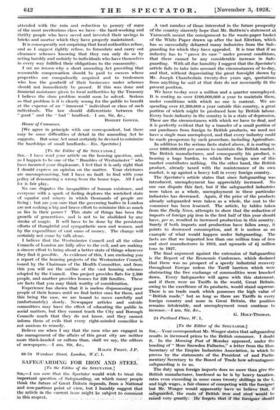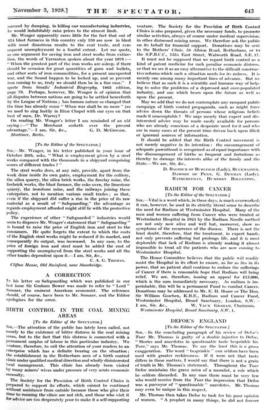[To the Editor of the SPECTATOR.] Sus,r---Your correspondent Mr. Weager
states that safeguarding results in -increased prices to the British consumer. I doubt it. In the Morning Post- of Monday appeared, under the heading of " More Snowden Fallacies," a letter from the Hon. Secretary of the Empire Industries Association, - in which he proves by- the statements of the President of and Parlia- mentary Secretary to the Board of Trade how advantageous safeguarding is to us.
The duty upon foreign imports does no more than give the British manufacturer, burdened as he is by heavy taxation, rates even exceeding in some cases twenty shillings in the £, and high wages, a fair chance of competing with the foreigner but Mr. Weager would apparently have us believe that, if safeguaided, the costs of British iron and steel would be raised very. greatly. He forgets that iftrie foreigner should
succeed by dumping, in killing our manufacturing industries, he would indubitably -raise prices to the utmost limit.
Mr. Weager apparently cares little for the fact that out of 434 blast furnaces in this country only 180 are now in blast with most disastrous results to the coal trade, and con- sequent unemployment to a fearful extent. Let me quote, as one argument for saving iron and steel works from extinc- tion, the words of Yarranton spoken about the year 1676 :— " When the greatest part of the iron works are asleep, if there should be occasion for great quantities of guns and bullets, and other sorts of iron commodities, for a present unexpected war, and the Sound happen to be locked up, and so prevent iron coming to us, truly we should then be in a fine case." I quote from Smalls' Industrial Biography, 1863 edition, page 79. Perhaps, however, Mr. Weager is of opinion that all disputes between nations are going to be settled henceforth by the League of Nations ; has human nature so changed that the time has already come " When war shall be no more " (as we used to sing lustily in Eton Chapel with our eyes on that best of men, Dr. Warre) ?
On reading Mr. Weager's letter I am reminded' of an old saying :—" The Merchant seeketh ever the present



















































































































 Previous page
Previous page